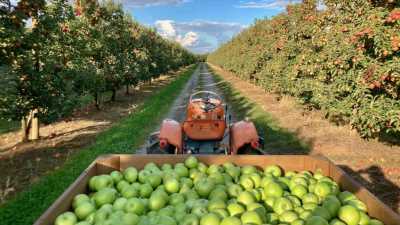Save articles for later
Add articles to your saved list and come back to them any time.
A large pear tree can be overwhelming – six metres high and nearly as wide, 500 kilograms of fruit in a good season.
Fruit picking is a test of physical and mental endurance.Credit: Keith Scott
In the tops of the trees, you can’t relax – every muscle is engaged filling a bag slung from your shoulders, holding your balance on a ladder 2½ metres above the ground.
You can pick from 7am until after 5pm, eat on the run. In a first season, a good picker will get four “bins” a day, or two tonnes of fruit – 10,000 to 12,000 pears hand-picked and carried to wooden bins at the back of a tractor in 20-kilo bags. On a hot day, five litres of water can leave you thirsty.
And the demands are not just physical. On one orchard, a fellow picker, Ash, told me a friend of his had had to give it up – he was strong enough physically, but in the orchard spent “too much time in his head”. Ash himself suffers from a chronic disease. He picks when he can.
The week before, I’d watched another picker, Dan – 206 centimetres tall (the same height, he said, as Tyson Fury) and with hands like dinner plates – sit on the ground with his head in his palms. He’d bruised some apples and couldn’t see how. He left the next day.
In three months picking pears and apples in the Goulburn Valley, I learnt that everyone’s got a story – Ash, Dan, Col, the local cow cocky returned to picking to pay the bills, Abdullah the Afghan refugee who filled an extra bag and gave it to me.
I learnt you can push through on hard days, but it can take a toll.
I also learnt there are good days. Days you can stand on the top rung of a ladder and watch the sun rise; the way, in early autumn, you can see the dew on the skin of the fruit.
It should be a place you want to be.
But my experience also reinforced the long-held reputation parts of the fruit-picking industry have for exploitation and has led to calls for action by the Australian Workers’ Union (AWU), the National Farmers’ Federation (NFF) and Federal Agriculture Minister Murray Watt.
It is clear that more than a year after the Fair Work Commission ruled that fruit pickers were entitled to a minimum wage, the ruling is being flouted.
The ruling that fruit pickers should be paid a minimum wage is being breached on farms.Credit: Keith Scott
On May 5, the federal government’s Fair Work Ombudsman issued a statement highlighting non-compliance, including over workers’ pay. From its on-site checks into 330 businesses, the ombudsman issued 64 infringements for payslip and record-keeping breaches and 18 compliance notices, including for underpayments. Ombudsman Sandra Parker said the breaches could indicate an increased risk of additional underpayments.
I’d gone to the Goulburn Valley to stay with a relative and to earn some extra cash. I’d not picked before, but had grown up in the bush and had done labouring jobs – carting hay, digging culverts, fighting bushfires when I was younger, the odd job on construction sites.
The first orchard I worked in was arranged via a phone call from home. The next two, I got “old school”, by driving to the farm gate. On all I worked hard – mostly four bins a day, good references and an offer of re-employment.
A chance discovery on the first orchard that I’d been underpaid led me to the others, chosen at random. In the course of three months, I was underpaid by an average of 35 per cent. Instead of the minimum wage of $26.73 per hour, I earned on average $17.50 per hour. Every orchard underpaid; one as low as $15 per hour, the highest $19 per hour.
The full bench of the Fair Work Commission ruled in November 2021 that workers who were paid “piecework” rates, or a set rate per bin (as I and my fellow workers were), were entitled to a minimum wage floor. It said existing piece rates were “not fit for purpose” and there was evidence of widespread underpayment. The Australian Workers’ Union said the decision was one of the “greatest victories” of its 135-year history and would “put a safety net” under pickers.
Payment of the minimum wage and recording of workers’ hours became a legal requirement from April 2022.
A year on, it’s clear from inside the orchard that some contractors and growers are not complying. They are neither paying the minimum wage nor keeping records of hours worked. Nor do they inform workers of their rights. On some orchards, workers have their pay illegally docked for the petrol used in farm machinery.
A spokesperson for the ombudsman told this masthead that compliance with the new requirements was “mixed” and many investigations, some in relation to “piecework”, were ongoing. The sector remained a priority, in part due to the employment of vulnerable workers.
A member of the Goulburn Valley Afghan community with knowledge of the industry, who asked that his name be protected, said underpayment of Afghan refugees had been occurring for years and was ongoing. Most had traumatic backgrounds, had lived in a state of uncertainty in Australia due to visa arrangements, and were supporting family members still in Afghanistan. Most were paid by labour contractors and were reluctant to raise the issue. “They understand very well that they’re being underpaid, but they are afraid to speak up,” he said.
Vulnerable workers say underpayment is still a problem.Credit: Keith Scott
Daniel Walton, national secretary of the AWU, told this masthead that underpayments were “rampant” and tougher regulations were needed. “The culprits deserve significant penalties.”
NFF national president Fiona Simpson said it was “good to see the cop on the beat” and there should be criminal penalties for deliberate wage theft, but the NFF did not believe theft or exploitation were widespread.
Watt said significant work had been done to bring employer groups and unions together, but making agriculture an appealing career started with “ensuring workers are being paid fairly”.
Michael Crisera, grower services manager at Fruit Growers Victoria, said he was not surprised by reports of infringements as many businesses were struggling with new laws requiring them to pay the guaranteed minimum wage. The three big supermarkets, Coles, Woolworths and Aldi, all told this masthead they had their own compliance regimes in place and, in one case, this had resulted in suspension of trade with a number of farms. None of the supermarkets responded to calls from the NFF for tougher competition laws to guarantee farmers a higher price.
I left the last orchard I worked on feeling torn. I’d got on well with the grower and had fond memories, too, of an earlier farm – collecting my tractor and bins and driving to the orchard before others arrived; the stillness before and after dawn.
But I saw the underbelly as well – the underpayment of workers who are not aware of their entitlements or of steps they could take to reclaim wages; growers who are not, in many ways, bad people, but should do better; an industry not fully in control and within which it is likely many underpayments go unreported. I felt cheated, disappointed that people I’d worked for had knowingly underpaid me and that I’ve now had to begin action to claim the wages owed.
I suspect there’s a bigger issue beyond the farm gate – supermarkets and distributors putting the squeeze on growers and forcing prices down, the rising cost of inputs, labour contractors who cream the top off workers’ wages. A broader review may be needed. But the answer can’t be the underpayment of hard-working people sweating on ladders in pear trees.
Keith Scott is a freelance writer based in Canberra. The names of people in this article have been changed to protect their privacy.
Most Viewed in National
From our partners
Source: Read Full Article





